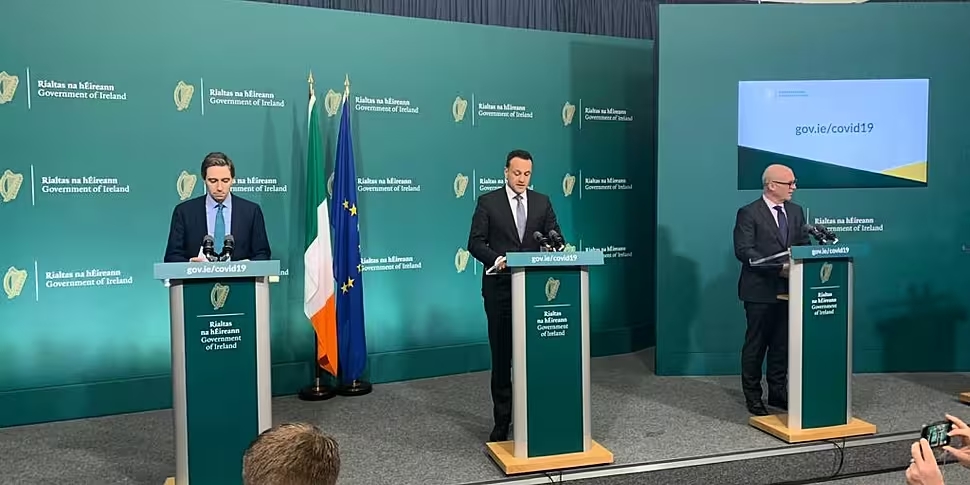Leo Varadkar is urging everyone to stay at home, unless going out is absolutely essential.
The government's announced another series of measures to slow the spread of the coronavirus in Ireland.
All non essential retail outlets are to close to the public from midnight tonight.
This is to allow our health service to deal with an expected increase in the next few weeks.
All previous measures announced by the government have been extended to Sunday April 19th.
Taoiseach Leo Varadkar says people should only head out for essential supplies and other limited reasons:
"I'm asking you to stay at home, if it all possible."
"This is the best way to slow the virus, ensure our hospitals are not overwhelmed and buy us the time we need to build more capacity testing, contact tracing, beds and ventilators."
"So you should only leave home to go to work, if you can't work from home and your attendance is essential."
"You should only go to the shops for essential supplies, out for medical or dental appointments, to care for others or physical exercise."
Dr Tony Holohan believes restrictions were brought in early to allow them "get ahead of" the spread of Covid-19..
— Ben Finnegan (@_BenFinnegan) March 24, 2020
Crisis Unemployment Payment Bumped Up
Workers who have lost their job as a result of the coronavirus will now get 350 euro per week.
While a Wage Subsidy Scheme will also be put in place aimed at encouraging employers to keep workers on their payroll.
Finance Minister Paschal Donohoe says the scheme will be available to business who have experienced a 25 per cent decline in turnover.
"For the next 12 weeks such employers will be supported in the order of 70% of an employees income."
"The maximum weekly tax free payment will be €410 per employee."
"This is equivalent to 70% of the net weekly income for someone on €38,000 per anum."
Here's a summary of the government's financial support scheme pic.twitter.com/XonP5C4SkB
— Seán Defoe (@SeanDefoe) March 24, 2020
Gatherings Of More Than 4 People Not Allowed
Groups of four or more people are not to gather unless they are from the same household.
Meanwhile, all organised indoor and outdoor events of any size are not to take place.
Gardai will be ensuring that people obey these measures and also comply with social distancing guidelines.
Taoiseach Leo Varadkar has said the new powers afforded to the Gardai will be used sparingly:
"There's going to be an increased presence of park rangers and Gardaí to ensure that physical distancing is being observed."
"In Ireland, since independence, we've always had policing by consent and not by coercion, and I don't intend for that to change now."
"That's not our way."
"The new powers afforded to the Gardaí will be used sparingly and only where necessary."
Private hospitals will work as public hospitals which should add 2,000 beds. They agreed to do that free of charge
— Seán Defoe (@SeanDefoe) March 24, 2020
State To Control Private Hospitals
The State is to take full control of every private hospital in the country for the duration of the Covid 19 emergency.
Private hospitals will operate as public ones, which the government says will add 2,000 beds and free up nine laboratories to cope with the rising numbers of coronavirus patients.
Health Minister Simon Harris says we can't have a public versus private healthcare system during the crisis.
"Patients with this virus will be treated for free.
"They'll be treated as part of a single national hospital service."
"For the duration of this crisis, the state will take control of all private hospital facilities and manage all of the resources, for the common good of all our people."
"There can be no room for public versus private when it comes to pandemic."
If you get Covid-19, whatever about work and income loss, the healthcare won’t cost you. The state will cover your care and testing.
— Ben Finnegan (@_BenFinnegan) March 24, 2020
Public Response "encouraging" - CMO
Chief Medical Officer Dr Tony Holohan says we're at an early stage in the illness, but the response from the public so far has been encouraging.
"One of the most significant early indicators we've seen is that the number of contacts we see associated with an individual case has dropped from 20 a week ago, to less than 5 now."
"That's shown that the message is getting through."













